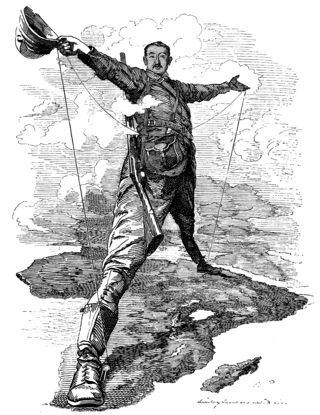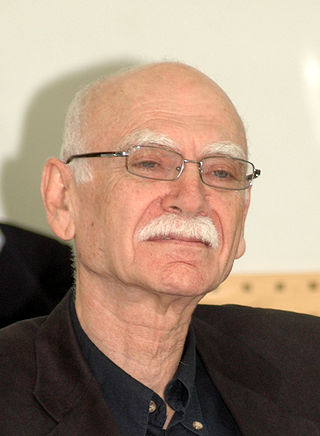
Colonialism is a practice by which a country controls people or areas, often by establishing colonies, generally for strategic and economic advancement. There is no clear definition of colonialism; definitions may vary depending on the use and context.

Imperialism is the practice, theory or attitude of maintaining or extending power over foreign nations, particularly through expansionism, employing not only hard power, but also soft power. Imperialism focuses on establishing or maintaining hegemony and a more or less formal empire.

Karma is a concept of action, work or deed, and its effect or consequences. In Indian religions, the term more specifically refers to a principle of cause and effect, often descriptively called the principle of karma, wherein intent and actions of an individual (cause) influence the future of that individual (effect): Good intent and good deeds contribute to good karma and happier rebirths, while bad intent and bad deeds contribute to bad karma and bad rebirths. As per some scripture, there is no link of rebirths with karma. Karma is often misunderstood as fate, destiny, or predetermination.
Post-structuralism is a term for philosophical and literary forms of theory that both build upon and reject ideas established by structuralism, the intellectual project that preceded it. Although post-structuralists all present different critiques of structuralism, common themes among them include the rejection of the self-sufficiency of structuralism, as well as an interrogation of the binary oppositions that constitute its structures. Accordingly, post-structuralism discards the idea of interpreting media within pre-established, socially constructed structures.
Decolonization or decolonisation is the undoing of colonialism, the latter being the process whereby imperial nations establish and dominate foreign territories, often overseas. Some scholars of decolonization focus especially on independence movements in the colonies and the collapse of global colonial empires. Other scholars extend the meaning to include economic, cultural and psychological aspects of the colonial experience.
Translation studies is an academic interdiscipline dealing with the systematic study of the theory, description and application of translation, interpreting, and localization. As an interdiscipline, translation studies borrows much from the various fields of study that support translation. These include comparative literature, computer science, history, linguistics, philology, philosophy, semiotics, and terminology.
Buddhism, also known as Buddha Dharma, and Dharmavinaya, is an Indian religion or philosophical tradition based on teachings attributed to the Buddha. It originated in present-day North India as a śramaṇa–movement in the 5th century BCE, and gradually spread throughout much of Asia via the Silk Road. It is the world's fifth-largest religion, with over 520 million followers (Buddhists) who comprise seven percent of the global population.

Oriental studies is the academic field that studies Near Eastern and Far Eastern societies and cultures, languages, peoples, history and archaeology. In recent years, the subject has often been turned into the newer terms of Middle Eastern studies and Asian studies. Traditional Oriental studies in Europe is today generally focused on the discipline of Islamic studies, and the study of China, especially traditional China, is often called Sinology. The study of East Asia in general, especially in the United States, is often called East Asian studies.

Edwin Cameron is a retired judge who served as a Justice of the Constitutional Court of South Africa. He is well known for his HIV/AIDS and gay-rights activism and was hailed by Nelson Mandela as "one of South Africa's new heroes". President Ramaphosa appointed him as Inspecting Judge of Correctional Services from 1 January 2020 and in October 2019 he was elected Chancellor of Stellenbosch University.

Itamar Even-Zohar is an Israeli culture researcher and professor at Tel Aviv University. Even-Zohar is a pioneer of polysystem theory and the theory of cultural repertoires.

Robert Chalmers, 1st Baron Chalmers, was a British civil servant, and a Pali and Buddhist scholar. In later life, he served as the Master of Peterhouse, Cambridge.

The Massachusetts Review is a literary quarterly founded in 1959 by a group of professors from Amherst College, Mount Holyoke College, Smith College, and the University of Massachusetts Amherst. It receives financial support from Five Colleges, Inc., a consortium which includes Amherst College and four other educational institutions in a short geographical radius.
The Edwin Mellen Press, sometimes stylised as Mellen Press, is an academic publisher. It was founded in 1972 by theology professor Herbert W. Richardson. It has been involved in a number of notable legal and academic controversies, sometimes being labeled as a vanity press. Most, but not all, of its published works are in English.

Postcolonial international relations is a branch of scholarship that approaches the study of international relations (IR) using the critical lens of postcolonialism. This critique of IR theory suggests that mainstream IR scholarship does not adequately address the impacts of colonialism and imperialism on current day world politics. Despite using the language of post-, scholars of Postcolonial IR argue that the legacies of colonialism are ongoing, and that critiquing International Relations with this lens allows scholars to contextualize global events. By bridging postcolonialism and International Relations, scholars point to the process of globalization as a crucial point in both fields, due to the increases in global interactions and integration. Postcolonial IR focuses on the re-narrativization of global politics to create a balanced transnational understanding of colonial histories, and attempts to tie non-Western sources of thought into political praxis.
André Alphons Lefevere was a translation theorist. He had studied at the University of Ghent (1964–1968) and then obtained his PhD at the University of Essex in 1972. When he died of acute leukemia, he was Professor of Germanic Studies at the University of Texas at Austin.
Edwin Gentzler is a Professor Emeritus of Comparative Literature and former Director of the Translation Center at the University of Massachusetts Amherst.
Sense-for-sense translation is the oldest norm for translating. It fundamentally means translating the meaning of each whole sentence before moving on to the next, and stands in normative opposition to word-for-word translation.
David Luke (1921–2005) was a scholar of German literature at Christ Church, Oxford.
The polysystem theory, a theory in the field of translation studies, implies using polyvalent factors as an instrument for explaining the complexity of culture within a single community and between communities. Analyzing sets of relations in literature and language, it gradually shifted towards a more complex analysis of socio-cultural systems.
Translation, aka translation: A transdisciplinary journal, was a biannual peer-reviewed academic journal covering translation studies. Established in 2011, it was published by St. Jerome Publishing, Edizioni di Storia e Letteratura, and the San Pellegrino University Foundation. The editor-in-chief was Siri Nergaard. Other members of the founding editorial board were Stefano Arduini, Edwin Gentzler, Valerie Henitiuk, Bob Hodgson, Paul A. Soukup, and Philip Towner.









